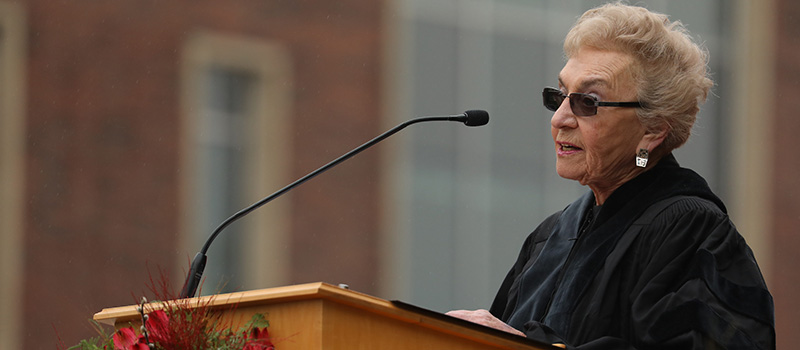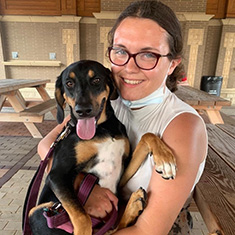Models of resilience
August 12, 2022 — When Celina Karp Biniaz ’52 arrived at Grinnell College, she had just three years of formal education. But she possessed an abundance of resilience.
Born in Poland in 1931, she was 8 years old when war broke out and her family was forced from their home. Biniaz and her parents survived labor and concentration camps, eventually winding up as workers in Oskar Schindler’s factory in Czechoslovakia. Biniaz was the youngest person on what came to be known as “Schindler’s List.” She was just 13 years old when the Russian army liberated the work camp at the end of the war.
Born in Poland in 1931, she was 8 years old when war broke out and her family was forced from their home. Biniaz and her parents survived labor and concentration camps, eventually winding up as workers in Oskar Schindler’s factory in Czechoslovakia. Biniaz was the youngest person on what came to be known as “Schindler’s List.” She was just 13 years old when the Russian army liberated the work camp at the end of the war.
After the war, Biniaz and her parents briefly returned home to Krakow, then had to flee Poland, eventually ending up in a small town in Germany, where they lived for two years. To help her catch up on her missed schooling, her parents hired tutors there, including a cloistered nun who tutored her in English and German. The family eventually emigrated to the U.S. joining an uncle who lived in Des Moines. There, at age 16, Biniaz was finally able to continue her formal education at North High School where her prior independent study allowed her to enter as a senior.
Then she was admitted to Grinnell.
 Celina Karp Biniaz ’52 speaks to Grinnell College’s class of 2018 during their commencement ceremony.
Celina Karp Biniaz ’52 speaks to Grinnell College’s class of 2018 during their commencement ceremony.
“I was barely 17 when Grinnell took a chance on me,” says Biniaz. “They gave me a full scholarship, and I’ve always been very grateful to the College for giving me the opportunity and allowing me to move forward with my life.”
A philosophy major who graduated Phi Beta Kappa with honors, Biniaz was awarded a scholarship to Columbia University and earned a master’s in philosophy of education. For 27 years, she taught students who had difficulty learning. She came back to her alma mater several times to share her story, most recently in 2017, and returned the following May as Grinnell’s 2018 commencement speaker.
“I’ve always wanted to do something for Grinnell,” says Biniaz, who lives with her husband in southern California, near their children and grandchildren. “I was helped, and I wanted to help others.”
She recently established the Celina Karp Biniaz ’52 Model of Resilience Award to support a graduating senior who, like Biniaz, has overcome obstacles to obtain their education. Award recipients are to pursue a teaching career or other work devoted to the education and welfare of young people.
Celina’s son Rob coordinated the establishment of the $200,000 endowment that will support this award into perpetuity. “Our goal was to find people who mirrored the journey that my mother took to get to Grinnell, and her path after Grinnell,” Rob says. “Students who overcame obstacles and who are interested in helping or teaching young people, which was my mother’s career.”
 Sarah Beisner ’22 and her dog
Sarah Beisner ’22 and her dog
Maggie
Sarah Beisner ’22 is the first recipient of the Model of Resilience Award. Like the prize’s namesake, she has a compelling life story with a demonstrated desire to give back and work for the common good.
Beisner is a paralegal at Children’s Rights, a nonprofit law firm in New York City that works on behalf of children in foster care and juvenile detention whose rights have been violated.
Originally from Denton, Texas, Beisner escaped a chaotic home life at age 15 by getting a scholarship to study in Bosnia. “My parents are really good people in their hearts, but my mom struggled with substance abuse issues and was in and out of jail and mental health facilities when I was growing up,” she says. “That stress caused a lot of other issues in our house. And there just weren’t resources available to help my parents cope.”
She later was accepted into a residential magnet high school and stayed with extended family over the summer. By senior year she was working full time at a restaurant. Beisner applied but didn’t qualify as a QuestBridge scholar. Discouraged by the rejection, she stopped focusing on college – until Grinnell came calling.
Grinnell’s admission staff had seen her QuestBridge materials and sent her an email admitting her to the College. Beisner didn’t open it though thinking it was something about her application not being complete. Then a second email came, congratulating Beisner on her recent admission and inviting her to visit. That one she opened and quickly went back to find the first one.
“I got really lucky that Grinnell read my application materials,” says the psychology and Spanish major. “I don’t know where my life would be if that hadn’t happened, but it wouldn’t be where I am now.”
At Grinnell, Beisner spent four years doing work-study for Mid-Iowa Community Action, which serves six Iowa counties with social services ranging from a food pantry to Head Start to helping people apply for food stamps and disability. “I loved the organization. You work relentlessly to help families,” she says.
Beisner interned with the Washington, D.C., Center for Children's Law and Policy, and the Oskaloosa-based Crisis Intervention Services, and was a youth associate for the Beloit Residential Treatment Center. In April 2021, she was named a Truman Scholar.
Now living in Brooklyn, New York, Beisner says she has found the work she wants to do. “I want to be part of working toward a system where families have what they need so kids can stay at home: affordable housing, access to health care, food, and a good education. And if a child has to be removed, that the child welfare system provides a loving and safe alternative.” The system, she says, let her and her family down, and she wants to improve it.
Beisner is honored to be the first recipient of the award. It helped her get established in New York City after graduation.
“Celina Biniaz is such a special woman who has lived a special life, so to be the first to get the award in her name, I don’t have the words to put to it,” Beisner says. “And it makes me doubly committed to the work I want to do, because giving me this money is saying that we believe you have encountered and overcome those obstacles and are committed to helping others. To have someone believe in me that much is such an empowering feeling.”
— by Anne Stein ’84